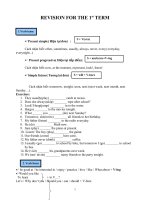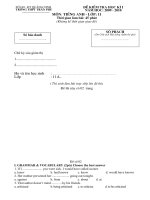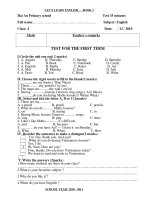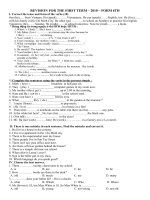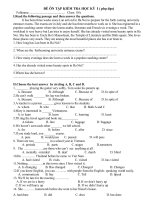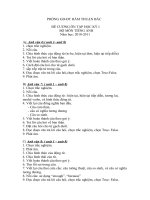revision for the first term he 3 nam
Bạn đang xem bản rút gọn của tài liệu. Xem và tải ngay bản đầy đủ của tài liệu tại đây (211.42 KB, 14 trang )
<span class='text_page_counter'>(1)</span>Date of teaching: 09/12/ 2010 Date of teaching:. Period 50. REVISION FOR THE FIRST TERM. A. AIMS I. OBJECTIVES: 1. Knowledge: - Topic: all topics from lesson 1 to lesson 6 - Vocabulary: the vocabulary from lesson 1 to lesson 6 - Structure: Verb tenses, gerund, present participle and past participle 2. Skill: - By the end of the lesson, students will be able to revise and remember all the structures they have learnt and give the correct tenses of the verbs Skills: writing, reading, speaking II. TEACHING AIDS: 1. Teacher’s preparation: charts ; textbooks 2. Students’ preparation: revise the old lesson B. PROCEDURE : Teacher’s activities. Time. I. ORGANIZATION: 2ms - Greets - Checks students’ attendance Who is absent today? II. CHECKING THE OLD LESSON: No checking III. NEW LESSON: * Warm-up: Game: “Noughts and crosses” Complete the following sentence with the given phrases of time and correct tense: “Lan (do) exercises ….” 5ms 1. now 2. yesterday 3. since 2 o’clock 4. at the moment 5. everyday 6. at 8 last night 7. when I came 8. tomorrow 7. for one hour - Devides the class into 2 groups - Asks students to mane all the tenses in the above sentences with above expressions of time - Asks students repeat the form and uses of verb tenses 1. Revision of verb tenses a. The simple present * Form?. Students’ activities Greet Answer. Play the game by completing the sentence Work in 2 groups Eg: 1. Lan is doing exercises now 2. Lan did exercises yesterday.. * Form: + Đối với động từ “to be”: (+) s + is/ am/ are ...... (-) s + is/ am/ are + not ...... (?) is/ am/ are + s + ..... ? + Đối với động từ thờng (ordinary verbs): (+) S + V(S/ES) + (O) (-) S + DONOT/ DOESNOT + V (infinitive) +(O) (?) DO/ DOES + S + V(infinitive) + (O) ?. * Uses?. - Diển tả một hành động thường xuyên xảy ra theo thói quen ở hiện tại: đi với usually, often, sometimes… every +.
<span class='text_page_counter'>(2)</span> b. The present progressive * Form? * Uses?. c. The present perfect: * Form? *Uses?. d. The simple past: * Form?. * Uses:. 13ms. time … - Diễn tả sự thật hiển nhiên, chân lý * Form: S + is/ am/ are + V-ing * Uses: diễn tả hành động đang xảy ra tại thời điểm nói. Thường đi với các trạng ngữ như now, at the moment, at the present hoặc kết hợp với câu mệnh lệnh ở trước. *Form: S + have/ has + V-ed/ Vcột 3 *Uses: - Diễn tả hành động xảy ra trong quá khứ, kéo dài cho tới hiện tại (dùng với since, for) - Diễn tả hành động vừa mới xảy ra (just) - Diễn tả hành động đã xảy ra nhưng không rõ thời gian - Diễn tả hành động xảy ra nhiều lần trong quá khứ và có thể lập lại ở hiện tại hoặc tương lai * Adv + Prep. : since + mốc thời gian, for + khỏang thời gian, lately, recently, so far, ever, never, just, before… * Form: * To be: S (I, He, She, It, danh tõ sè it) + was .. S (We, You, They, danh tõ sè nhiÒu ) + were + … * Ordinary verbs (động từ thờng) (+) S + V-ed (đối với những động từ có qui tắc)/ Vcột 2 (động từ bất qui tắc) (-) S + did + V nguyªn thÓ + … (?) Did + S + Vnguyªn thÓ + …? - Yes, S + did/ No, S + didn’t Uses: Thì quá khứ đơn diễn tả: + hành động đã xảy ra và chấm dứt ở 1 thời điểm xác định ở quá khứ: Eg: I taught English last year. + thói quen hoặc hành động thờng làm ở qu¸ khø: Eg : We often played football on Sunday. + hành động kết tiếp nhau trong quá khø: Eg: I never smoked, drank or stayed up late.. * Form: S + was/ were + V-ing ….
<span class='text_page_counter'>(3)</span> * Uses: - Diễn tả một hành động đang xảy ra tại điểm thời gian xác định trong quá khứ - Diễn tả một hành động đang xảy ra trong quá khứ thì có một hành động khác xen vào (kết hợp với quá khứ đơn). e. The past continuous: * Form?. - Gerund is functioned as a subject Gerund is after some verbs: like, love, hate, dislike, enjoy, avoid, practice, keep, mind, finish, start, begin, stop, give up , can’t stand, can’t bear… - Gerund is after prepositions * some adj + preposition:. * Uses?. 2. Revision of Gerund: - Asks students to repeat something about gerund. 5ms. - Gives feedbacks 3. Present participle and Past Participle as 5ms adjectives: - Repeats present participle and past participle as adjectives: + Present participle : (V-ing) được dùng để miêu tả sự vật và mang nghĩa chủ động + Past participle (V-ed) : dduwwocj dùng để miêu tả cảm xúc của người và mang nghĩa bị động Eg: This is a tiring work. (Tiring lµ hiÖn t¹i phân từ đứng trớc work là danh từ). I am tired of this work. (Tired lµ qu¸ khø ph©n tõ ) + Các động từ thờng gặp sau đây thêm đuôi ING/ED trë thµnh tÝnh tõ nh: tire, bore, surprise, amuse, frighten, interest, excite, please Tired of, interested in, surprised at, amused at/ by, axcited about, bored with, frightened of, terrified of, pleased with, 4. Exercises: a. Exercise 1: Give the correct form of the verb in brackets: 1. Yesterday, he (come) home, (have) dinner and (go) to bed. 14ms 2. At the present that author (write) a novel about students’ life. 3. When I arrived at his house, he (read) a book. 4. My brother (try) to learn French for years, but he (not succeed) yet. 5. The earth (circle) the sun once every 365 days. 6. My brother (be) a teacher of history. He (finish) university in 1980. He (work) as a teacher of history for 22 years. Two years ago, he (come) to Hanoi for. Eg: We read an interesting book. We are interested in reading book. The film is boring. We are bored with the film. Funny stories is amusing. We are amused at funny stories.. Do exercise individually Expected answers: 1. came/ had/ went 2. is writing 3. was reading 4. has tried/ has not succeeded 5. 5. circles 6. is/ finished/ has worked/ came 7. reads/ likes/ has bought 8. was watching.
<span class='text_page_counter'>(4)</span> his holiday. 7. My brother usually (read) a book after dinner. He (like) books very much and he (buy) many novels recently. 8. He (watch) a football match on TV at 9 last night.. Expected answers: 1. of 2. with/ to 3. of 4. at 5. on 6. of 7. in 8. on 9. with 10. of. b. Fill in the blank with suitable preposition: 1. He is fond ______ sitting alone in a boat and doing nothing. 2. The boy is bored ________ listening _______ the opera singing. 3. She has been out _______ work. 4. I can’t help you. I am bad _______ English. 5. He usually watches the news ______ TV at 6. 6. Are you afraid ______ swimming in the sea? 7. I am not interested _______ what you say. 8. Do you mind living ______ your own? 9. Mary is fed up _______doing the same thing everyday. 10. I am tired ______ the work. I want a holiday.. listen to the teacher. IV. CONSOLIDATION: Repeat the structures they have revised. V. HOMEWORK: - Asks students to revises all the structures. 1’. Date of teaching: 09/12/ 2010 Date of teaching:. Period 51. REVISION FOR THE FIRST TERM (cont).
<span class='text_page_counter'>(5)</span> A. AIMS I. OBJECTIVES: 1. Knowledge: - Vocabulary: the vocabulary from lesson 1 to lesson 6 - Structure: comparison of adjectives and adverbs, relative pronouns and adverb 2. Skill: - By the end of the lesson, students will be able to revise and remember all the structures they have learnt, give the correct form of the words, and combine the sentences using relative pronouns Skills: writing, reading, speaking II. TEACHING AIDS: 1. Teacher’s preparation: charts; textbooks 2. Students’ preparation: revise the old lessons B. PROCEDURE : Teacher’s activities. Time. I. ORGANIZATION: - Greets 2ms - Checks students’ attendance Who is absent today? II. CHECKING THE OLD LESSON: No checking III. NEW LESSON: 1. Revision of comparison of adjectives and adverbs - Asks students to repeat comparison of adjectives and adverbs * Short adj/ adv? * Long adj/ adv? - Asks students to give some irregular adjectives and 5ms adverbs:. 2. Revision of relative pronouns and adverbs: - Asks students to repeat relative pronouns and adverbs 2.1. Who: Ex1: The man has met your boss.He come from Italy. subject → The man who comes from Italy has met your boss relative clause Ex2: We have met the girl. She studies in the shool. → We have met the girl who studies in the school. relative clause Ex 3: We like the man. You talked to him yesterday. object → We like the man who you talked to yesterday. Students’ activities Greet Answer. Repeat the form * Short adj/ adv: adj/ adv + er * Long adj/ adv: more + adj/ adv Good/ well – better Bad/ badly – worse Much/ many – more Little – less Far – farther/ further Old – older/ elder. 2.1. Who (người mà): Thay thế cho danh từ chỉ người đứng trước và làm chủ ngữ hay tân ngữ cho mệnh đề quan hệ 15ms Eg: The boy who sits next to me is very intelligent. I don’t like the men who don’t speak the truth..
<span class='text_page_counter'>(6)</span> * Lưu ý “Who” trong cấu trúc: .... Noun/ pronoun (person) + who + verb ..... .... Noun / pronoun (person) + who + subject + verb...... (Chúng ta có thể bỏ đại từ quan hệ trong trường hợp này.) 2.2. Which (vật mà): Ex1: She show me the table. It was made by her father. She shows me the table which was made by her father. Ex2: Do you like this car ? Mr. Tan bought it last month. Do you like this car, which Mr.Tan bought last month ? * Lưu ý các cấu trúc. - ...... noun / pronoun (chỉ vật) + which + verb ........ - ......noun/ pronoun (chỉ vật) + which + subject + verb ..... Note: “Which” có thể được sử dụng để thay thế cho một mệnh đề đứng trước nó (= and this/ and that) Ex: Tom is so lazy, and this makes Mrs. Green worried. Tom is so lazy, which makes Mrs. Green worried. 2.3. That ( vật mà, người mà): dùng thay thế cho cả who, whom, which. Eg: The flowers that I cut this morning are still fresh. Trong các trường hợp sau đây “That” thường được dùng nhiều hơn: - Khi đi sau các hình thức so sánh hơn nhất: Eg: He is the best man that I have ever seen. - Khi đi sau: all, same, only, the first, the last và đôi khi sau it is that và it was that Eg: You are the only person that can help me. Any boys that want to succeed must work hard. It is his wife that makes the decision in his family. - Khi đi sau các đại từ bất định: noone, nobody, nothing, somebody, someone, anybody… Eg: She always had everything that she wanted. He never says anything that is worth listening to. - Khi danh từ đứng trước bao gồm cả người lẫn vật: Eg: He talked of the people and the places that he had visited. “That” không được sử dụng trong trường hợp sau: - Trong mệnh đề quan hệ không xác định (trước có dấu phẩy). 2.2. Which (vật mà): dùng thay thế cho danh từ chỉ vật, làm chủ ngữ hoặc tân ngữ. Listen and take notes. 2.3. That ( vật mà, người mà): dùng thay thế cho cả who, whom, which.. Listen and take notes. Listen and take notes.
<span class='text_page_counter'>(7)</span> - Trước có giới từ 2.4. Where (= in/ at which) Eg: The place where we met was an old pagoda. This is the house where I lived when I was young. * Thường xuất hiện trong cấu trúc: ...... noun/ pronoun ( = a place) + where + subject + verb ...... Ex: We visit the hospital. We were born there/in that hospital We visit the hospital where we were born. 3. Exercises: 3.1. Fill in the space with the right form of the words: 1. Oxford is the _______ university in England.(old) 2. Lan is ______at cooking than I am. (good) 3. English people are fond of ____ football. (watch) 8ms 4. Marconi’s father was a rich _______ businessman. (Italy) 5. Newton was very ______in Mathematic. (interest) 6. Jack doesn’t mind ______at night. (work) 7. Jane married a _______ businessman. (success). 8. Don’t go to see that play. It is very ______(bore) 9. I like ____ tennis, but I wouldn’t like to play with her. (play) 10. I am _______ of working all day. (tire) 3.2. Combine sentences by using relative pronouns or relative adverbs: 1. The boy has not been found yet. He ran away from home. 2. Last week I went back to the town. I was born there. 13ms 3. This is the colour television. My father bought it last month. 4. The girl is very nice. She usually helps old people. 5. Next week my father will go to Hanoi. He's working there. 6. Last month I talked to a foreigner. He is from England. 7. The new school will be opened next month. It was built by the workers in our district. 8. This is the theatre. His father used to work there. 9. Oxford is a great university. It is known all over the world. 10. The books belong to Ann. They are on the table. 11. The house has been built in the forest. It doesn’t have electricity. 12. She took me to the village. She was born and grew up there. 13. The man is a famous doctor. I met him yesterday.. 2.4. Where (= in/ at which) - dùng thay thế cho trạng ngữ chỉ nơi chốn, đứng sau danh từ chỉ nơi chốn. Do exercise individually and then in pairs Suggested answers: 1. oldest 2. better 3. watching 4. Italian 5. interested 6. working 7. successful 8. boring 9. playing 10. tired 1. The boy whe ran away from home has not been found yet. 2. Last week I went back to the town where I was born. 3. This is the colour television which my brother bought last month. 4. The girl whp usually help old people is very nice. 5. next week my fether will go to Hanoi, where he is working. 6. Last month I talked to a foreigner who is from England 7. The new school which was built by the workers in our district will be opened next month. 8. This is the theatre where my father used to work. 9. Oxford, which is a great university, is known all over the world. 10. The books which are on the table belong to Ann. 11. The house which has been built in the forest doesn’t have electricity..
<span class='text_page_counter'>(8)</span> 14. Do you know the dentist? He pulled Mary’s tooth yesterday. 15. The woman spoke to me. She was very helpful. 12. She took me to the village where she was born and grew up. 13. The man who I met yesterday is a famous doctor. 14. Do you know the dentist who pulled Mary’s tooth yesterday? 15. The woman who spoke to me was very helpful.. IV. CONSOLIDATION: Repeat the structures they have revised. V. HOMEWORK: - Asks students to revises all the structures. Listen to the teacher 2ms. Date of teaching:10/12/ 2010 Date of teaching:. Period 52. REVISION FOR THE FIRST TERM (cont). A. AIMS I. OBJECTIVES: 1. Knowledge: - Vocabulary: the vocabulary from lesson 1 to lesson 6 - Structure: all the structures they learnt in the first term 2. Skill: - By the end of the lesson, students will be able to revise and remember all the structures they have learnt, and do exercises Skills: writing, reading, speaking II. TEACHING AIDS: 1. Teacher’s preparation: charts; textbooks, handouts.
<span class='text_page_counter'>(9)</span> 2. Students’ preparation:. revise the old lessons, doing the exercises at home. B. PROCEDURE : Teacher’s activities. Time. I. ORGANIZATION: - Greets 2ms - Checks students’ attendance Who is absent today? II. CHECKING THE OLD LESSON: No checking III. NEW LESSON: 1. Choose the word whose underlined part is pronounced differently from the others: 1. A. decided B. finished C. wanted D. succeeded 2. A. car B. carriage C. corn D. city 3. A. success B. song C. music D. soup 3ms 4. A. churches B. chairman C. chemist D. changes 5. A. heat B. seat C. great D. meat 2. Choose the best answers: 1.. This is the school _________ my father used to teach. A. which B. who C. where D. that 2. If Lan speaks English well, she ________ the job. A. gets B. will get C. got D. has got 3. This is the person __________ wrote "Hamlet". A. which B. where C. he D. who 4. A _________ is a person who plays football. A. football player C. playing football B. football match D. player football 5. She is from Paris. She is _________ A. France C. a France B. French D. the French 15ms 6. It is the articles ______ cause me a lot of troubles. A. who B. which C. that D. they 7. To Huu is ______ most famous poet that I admire. A. a B. an C. one D. the 8. My sister enjoys living in Ho Chi Minh city __________ it is a big city in Vietnam. A. because B. so C. so that D. if 9. Do you get tired _________ watching TV every night? A. with B. by C. of D. at 10. She was filling in the ________ form. A. application B. applicant C. apply D. appliance 11. We had a __________ discussion about football. A. bore B. boring C. bored D. boredom 12. His _________ makes his parents happy. A. success B. succeed C. successful D. succeeded 13. I can’t stand ________ at home all day. A. stayed B. to stay C. staying D. stay 14. Don’t be afraid _________ the dog. He’s quite harmless. A. in B. of C. at D. for. Students’ activities Greet Answer. Do exercises 1. 2. 3. 4. 5.. B D C C C. 2. Choose the best answer: 1. A 2. B 3. D 4. A 5. D 6. C 7. D 8. A 9. C 10. A 11. B 12. A 13. C 14. B 15. A 16. C 17. A 18. A 19. B 20. D 21. B.
<span class='text_page_counter'>(10)</span> 15. I am _________ of gardening and growing flowers for hours. A. fond B. keen C. fed D. interested 16. Everyday I spend 2 hours ________ English. A. practise B. to practise C. practising D. practised 17. She is too _______ with her work, so she joins the football team of the school. A. bored B. busy C. fed up D. tired 18. It took three and a half hours __________ to Singapore. A. to fly B. flying C. fly C. to be flown 19. ________ is a popular sport in Europe. A. to ski B. skiing C. ski D. to skiing 20. It is not easy ________ a high-paid job. A. find B. finding C. finds D. to find 21. She doesn’t like going _________ in the sea in summer. A. to swim B. swimming C. to be swimming D. swim 22. Human beings must stop ________ the environment. A. to pollute B. polluted C. pollute D. polluting 23. His mother, ________ is a bank executive, is very intelligent. A. who B. that C. which D. she 24. “Is Mr. Peter in?” “He has _______ left the office, but he will be back shortly.” A. just B. since C. ever D. soon 25. _________ he loves hiking, he seldom has to get out in the country. A. But B. So C. And D. Although 26. ______ we were tired, we sat down beside the stream. A. Because of B. As C. If D. And 27. The machine _______ has now been repaired. A. that broken down B. which is broken down C. that broke down D. which broke 28. They are not coming, _______? A. are they B. aren’t they C. they are D. don’t they 29. They want ________ by air because it is much faster than other means of transport. A. travel B. travelling C. travelled D. to travel 30. Lan hasn’t written to me _______ we met last time. A. for B. since C. when D. before 31. He would rather _________by train through the mountains than go by bus. A. to travel B. travel C. travelled D. travelling 32. That’s the best film I __________. A. saw B. have ever seen C. see D. am seeing 33. Who ________ you English? A. do teach B. teaches C. teach D. teaching 34. It was a surfboard _______ Mary gave me for my birthday last year. A. Who B. whom C. which D. that 35. London is the city in ______ I was born. A. where B. which C. that D. there 36. Do you know a nearby restaurant _______ has good food? A. that B. who C. where D. in which 37. I live in a building _______ has 40 floors?. 22. D 23. A 24. A. 25. D 26. B 27. C 28. B 29. D 30. B 31. B 32. B 33. B 34. D 35. B 36. A 37. A 38. C 39. B.
<span class='text_page_counter'>(11)</span> A. which B. in which C. it D. where 38. I live in a building _______ there are 40 floors. A. that B. which C. where D. in where 39. Nowadays almost no one speaks Latin, ______is the reason why it is called a dead language. A. what B. that C. which D. who 40. Huy told me about the English course, _______ He’s enjoying very much. A. where B. which C. that D. who 3. Read the following passage and choose the best answer to complete the passage: James Cook was born in England (41) 1728. His parents (42) poor farm workers. (43) James was 18, he found a job on a coastal ship. He worked on ships until he was 27 years old, and then he joined the navy. He fought (44) Canada in a war against France. In 1768 King George III made him the captain of a ship and sent him to the Pacific. He was gone (45) nearly three years when he returned, he was a national hero. 41. A. in B. at C. on D. during 5ms 42. A. are B. be C. were D. was 43. A. while B. when C. because D. during 44. A. at B. in C. to D. against 45. A. in B. since C. for D. during 4. Find mistakes in the following sentences: 46. We are surprised in his intelligence. A B C D 47. They don’t mind work overtime if they get it. A B C D 7ms 48. I am looking forward to meet you again soon. A B C D 49. She is a beautiful very girl. AB C D 50. She is used to jog a lot. Now she doesn’t. A B C 51. Is she interesting in listening to her lectures? A B C D 52. It is the English language it causes me a lot of difficulty. A B C D 53. He stopped to smoke because cigarettes are harmful for his health. A B C D 54. My family spent an interested holiday in Da Lat last month. A B C D 55. He was so tiring that he could not go home. A B C D 5. Complete the following sentences using given words: 56. I/ hate/ ask/ my mother/ for/ money. 57. He/ fed up with/ do/ the same/ thing/ every day. 58. We/ not/ mind/ get/ up/ early/ the morning. 5ms 59. She/ interested/ go/ to/ cinema/ on Sundays. 60. Oxford/ the oldest/ university/ England. 6. Read the passage and choose the best answer: The great English play writer and poet, William Shakespeare was born on April 23, 1564 in small town of Stratford – upon – Avon, about seventy-five miles from London. He was the son of a tradesman. He went to Stratford. 41. A 42. C 43. B 44. B 45. C. 46. C 47. B 48. C 49. C 50. B 51. B 52. B 53. A 54. B 55. B. 56. I hate asking my mother for money. 57. He is fed up with doing the same thing every day. 58. We don’t mind getting up early in the morning. 59. She is interested going to the cinema on Sundays. 60. Oxford is the oldest.
<span class='text_page_counter'>(12)</span> Grammar School when he was a boy. At twenty-one he left Stratford for 8ms London where he joined a theatrical company and worked as an actor and a play writer. In the late 90s the Globe theatre was built on the bank of the Thames. Shakespeare became one of its owners. It was in the Globe that most of Shakespeare’s plays were staged at that time. In 1613 Shakespeare left London and returned to his native town of Stratford-upon-Avon. Three year later, on April 23, 1616, he died and was buried here. 61. William Shakespeare’s hometown was in _________________. A. London B. England C. Stratford D. Avon 62. When he was twenty one he did not work _____________. A. for a theatrical company B. as an actor C. as a play writer D. in Globe theatre 63. He died and was buried ______________. A. in his hometown B. in London C. in the Thames D. in Globe Theatre 64. It is not true that _________________. A. W. Shakespeare’s father was a tradesman B. W. Shakespeare built the Globe Theatre C. W. Shakespeare became one of its owners D. Most of W. Shakespeare’s plays were staged in Globe 65. It i true that he left his hometown for London in ___________. A. 1564 B. 1585 C. 1613 D. 1616. university in England.. 61. C. 62. D 63. A 64. B 65. B. IV. CONSOLIDATION: Repeat the structures they have revised. V. HOMEWORK: - Asks students to revises all the structures Date of teaching:15/12/ 2010 Date of teaching:. Period 53. REVISION FOR THE FIRST TERM (cont). A. AIMS I. OBJECTIVES: 1. Knowledge: - Vocabulary: the vocabulary from lesson 1 to lesson 6 - Structure: all the structures they learnt in the first term 2. Skill: - By the end of the lesson, students will be able to revise and remember all the structures they have learnt, and do exercises Skills: writing, reading, speaking II. TEACHING AIDS: 1. Teacher’s preparation: charts; textbooks, handouts 2. Students’ preparation: revise the old lessons B. PROCEDURE : I. ORGANIZATION: - Greets - Checks students’ attendance II. CHECKING THE OLD LESSON:.
<span class='text_page_counter'>(13)</span> No checking III. NEW LESSON:. PRACTICE TEST Thêi gian lµm bµi: 45 phót Chọn phơng án đúng (ứng với A, B, C, hoặc D) để hoàn thành mỗi câu sau: C©u 1: London stands on the Thames, ______________. A. what devides it into two equal parts B. which devides it into two equal parts C. where devides it into two equal parts D. that devides it into two equal parts C©u 2: It is two years since I____________. A. talked to last Mai B. have talked to Mai C. last talked Mai D. last talked to Mai C©u 3: The teacher made us __________. A. study hard for the final examination B. studying hard for the final examination C. to study hard for the final examination D. studied hard for the final examination C©u 4: Cua Lo is one of the _____________. A. famous tourist attractive in Nghe An Province B. most famous tourist attractions in Nghe An Province C. more famous tourist attractions in Nghe An Province D. famous tourist attractions in Nghe An Province Đọc kỹ đoạn văn sau và chọn phơng án đúng (ứng với A, B, C hoặc D) cho mỗi chỗ trống: George Washington ____(5)___on February 22 nd, 1732 in Virginia. He grew up on a farm in Virginia. George did not go to school. His father taught him at home. George’s favourite subject ___(6)_____ math. George learned to be surveyor of land when he ___(7)_____ up. He joined the army and was a leader during the American Revolution. He later became the first President of the United States. George Washington ___ (8)_____ by his people the “Father of our Country” C©u 5: A. was born B. born C. bear D. to be born C©u 6: A. were B. was C. is D. are C©u 7: A. is growing B. was growing C. grow D. grew C©u 8: A. is called B. are called C. was called D. were called Chọn từ. Cụm từ thích hợp (ứng với A, B, C hoặc D) để hoàn thành mỗi câu sau: C©u 9: Maria hasn’t visited her parents ____________. A. since many years B. many years since C. many years ago D. for many years C©u 10. Look! That man _________ to open the door of your car. A. try B. is trying C. tried D. has tried C©u 11. Ha was _________ by the clown. A. amusing B. amuse C. amusingly D. amused C©u 12. The manager will reply all letters __________ are sent to him. A. when B. which C. if D. who C©u 13. I am interested ______playing football but I am not very good _________ it. A. in - at B. in - of C. for - in D. at - in C©u 14. Mark Twain’s last book was written in 1909, one year before his _________. A. died B. dead C. death D. dying C©u 15. He never minds _________ English in class. A. speak B. speaking C. to speak D. speaks C©u 16. This is the house __________ my mother was born. A. in which B. what C. where D. Both A and C are correct C©u 17. Every day I spend two hours ____________ English. A. practise B. to practise C. practiced D. practicing C©u 18. When I phoned Ann, she __________ her homework. A. is doing B. is working C. was working D. was doing C©u 19. Did you use to __________ over time? - No, sometimes. A. worked B. working C. work D. worker C©u 20.This is the beach __________ I spent most of my time. A. which B. that C. where D. when C©u 21. The train is not so ________ as a bus. A. quick B. quicker C. quickest D. quickly C©u 22. What does he do now? - He is working ________ a taxi-driver. A. at B. as C. to D. in C©u 23. I was surprised ____________ the way he behaved. It was quite out of character. A. at B. in C. about D. from C©u 24. Thomas Edison was the ___________ of the electric light bulb. A. engineer B. gardener C. inventer D. inventor C©u 25. They took her to the International Hospital, ________ is only a mile away. A. in which B. that C. where D. which C©u 26. She is not keen on working with children, _________ is strange to us. A. which B. that C. who D. what C©u 27. Whenever we sing the national anthem, we feel __________ of out country..
<span class='text_page_counter'>(14)</span> A. famous B. frightened C. keen D. proud C©u 28. The ability to work well for long hours is her _________. A. length B. width C. strength D. height C©u 29. Daisy is ________ about going on this trip. She thinks it is going to be an _________ trip. A. excited - excitement B. excitement - excited C. exciting - excited D. excited - exciting C©u 30. It is the assimilation of borrowings ___________ has made English international. A. where B. that C. what D. who Đọc kỹ đoạn văn sau và chọn phơng án trả lời đúng (A, B, C hay D): No visitor to Britain should go home without spending some time in Stratford-upon-Avon. Situated in the heart of England, it is a rich town both in history and in culture. Stratford is a busy market town with a population of twenty-three thousand, and contains many streets and building unchanged since medieval times. It is surrounded by some of the prettiest countryside in England, and it is an ideal base of those wishing to visit such places of interest as Warwick castle, or beautiful modern cathedral in Coventry. Without doubt, Stratford is best known as the town where the playwright William Shakespeare was born and died. Here you can visit his birthplace, and other buildings associated with his family. Visitors to Stratford will find no lack of evening entertainment. There are restaurants to suit all tastes, and in the evening the Royal Shakespeare theatre offers an exciting and varied repertory, giving you the chance to see some of the best actors in the country, on stage. C©u 31. What is the main idea of the passage? A. Stratford and its history B. Stratford and it attractions C. Stratford, a busy market D. Stratford, the town where Shakespeare was born C©u 32. According to the passage, Stratford is ____________. A. in Coventry B. the centre of England C. near the prettiest countryside D. in the centre of England C©u 33. Visitors to Stratford can _________. A. visit many historic places B. meet William Shakespeare C. go to the cinema D. have the chance to be actor C©u 34. Stratford is _________. A. the place where you can visit Shakespeare B. the place where Shakespeare died C. the place where Shakespeare was born D. Both B and C are correct C©u 35. The word “medieval” in line 4 refers to _________. A. a long time ago B. several times C. today D. this time Chọn từ có phần gạch chân đợc phát âm khác với các từ còn lại: C©u 36. A. inventor B. medium C. lecture D. president C©u 37. A. hundred B. bustle C. business D. number C©u 38. A. modern B. communication B. official D. technology C©u 39. A. refusal B. music C. student D. studying C©u 40. A. modern B. opera C. mother D. hobby Xác định từ/ cụm từ gạch chân cần phải sửa: C©u 41. This is the house which I buy last year A B C D C©u 42. It is the assimilation of borrowings what makes English flexible. A B C D C©u 43. He went to see the house which he used to live when he was small. A B C D C©u 44. I was listening to the radio last night when the door bell rings. A B C D C©u 45. He usually catch the bus at 7 every morning to go to school. A B C D.
<span class='text_page_counter'>(15)</span>


